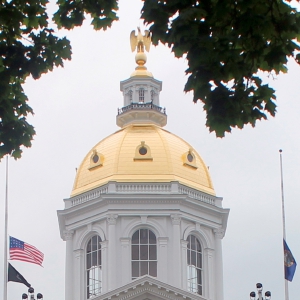Opinion: Out of balance – the overwhelming cost of book banning
| Published: 09-24-2023 7:00 AM |
Pete Bromberg is the associate director of EveryLibrary. Sy Montgomery is an award winning author of 34 books for adults and children. Katherine Towler is an author, activist and professor. She teaches in the Mountainview MFA Program in Writing at Southern NH University.
Book challenges in libraries are nothing new, but until recently they generally involved a single title, in a single library, being filed by one person. Such challenges are best handled locally, where those raising questions have, in most cases, acted in good faith.
But today we are seeing the weaponization of school and public library policies by a small number of people, filing an unmanageable number of challenges that grind our public institutions to a halt.
The bombarding of our local libraries with book challenges comes at a high cost. It is a cost burden that is borne by all taxpayers, yet it is being driven by very few people who are not representative of the majority of Americans who oppose book banning and who don’t believe there are problematic books on library shelves.
For example, the American Family Survey, (BYU / Deseret News) found that only 16% of Americans believe public school libraries include inappropriate books on their shelves and that a mere 12% agree that books should be removed from libraries if a parent objects.
Despite widespread opposition to book banning, a few zealous people, often bragging that they haven’t read the book they are challenging and filing cut-and-paste complaints, are able to pervert current policies and processes and force the rest of us to pay the price.
How few people are filing complaints? The Washington Post studied over 1,000 book challenges and found that 11 people were behind the complaints. In one Utah school district, a married couple was behind 199 out of 205 challenges. The district reported that the challenges required 10,000 hours of staff time and cost more than $100,000. In Texas, documents show that more than 16 employees spent over 225 hours at a cost of $30,000 on a single book challenge at the Spring Branch ISD.
Of course, citizens should be able to offer feedback on public policy. But we must have a sensible balance. Americans already enjoy numerous opportunities to share their concerns on policy through multiple channels including calls, emails, public hearings, and board and committee meetings. But the appropriate scope of feedback from constituents is policy, not the nitty-gritty of operational decisions. Indeed, we would be hard-pressed to identify any agency that allows a single person to initiate, without vetting, a time-consuming and expensive review process.
Article continues after...
Yesterday's Most Read Articles
 Neighboring landowner objection stalls Steeplegate redevelopment approval
Neighboring landowner objection stalls Steeplegate redevelopment approval
 Northeast Coffee Festival comes to Concord this weekend
Northeast Coffee Festival comes to Concord this weekend
 Hopkinton tries to nab out-of-town trash bandits
Hopkinton tries to nab out-of-town trash bandits
 On the Trail: Democrat Maggie Goodlander jumps into race to succeed Kuster
On the Trail: Democrat Maggie Goodlander jumps into race to succeed Kuster
 NH Senate panel frowns on bill to ease vehicle inspection requirements
NH Senate panel frowns on bill to ease vehicle inspection requirements
 Steeplegate project to reopen to public comment as developer seeks to reduce required parking
Steeplegate project to reopen to public comment as developer seeks to reduce required parking
In considering what a balanced approach looks like, it is helpful to remember that we already have meaningful vetting in place for the acquisition of library books. Books are selected by professionals (often state-licensed), who consider reviews and publisher recommendations and apply state and federal laws and local policies that were all passed in public meetings. In schools, policies are further aligned with state standards. There are significant opportunities for public input at every stage of policymaking.
Given the many existing opportunities for public input and the high cost of abuse of process that we are now seeing across the country, it is clear that we are in need of a more reasonable, common-sense approach that balances the rights of citizens to provide input with the responsibility of our government officials to effectively and efficiently manage limited public resources.
Local policies have traditionally served us well but are now being abused, creating gridlock and wasteful spending as our public servants struggle to manage an avalanche of paperwork, committees, and ongoing appeals. The time spent dealing with book challenges takes librarians, teachers, and board members away from meaningful work — investing in student success, improving literacy, and delivering programs that support the educational, cultural, and economic vitality of our communities.
Common sense legal and policy guardrails are now needed to balance the public’s right to express concerns with the right of our public institutions to operate efficiently on behalf of all citizens.
One policy proposal is simply to allow for public comment and feedback on public policy and law, but clarify that feedback about operations (book selection, programming, spaces, services, etc.) while welcomed, will not automatically lead to a formal, time-consuming review. If we step back and apply a small government lens to the problem, it is evident that we need to update library policies to keep individuals from initiating unpopular book challenges that lead to endless committees and appeals, bloat operations, suck up time and money, and negatively impact our students and our communities.
These guardrails are necessary to reduce waste and bureaucracy and prevent individuals from effectively hijacking the valuable time of our teachers, librarians, administrators, and board members, compelling them to spend time on challenge after challenge, and forcing them to serve a loud minority interest instead of delivering value and service to all taxpayers.
]]>


 Opinion: An opportunity to help law enforcement protect children
Opinion: An opportunity to help law enforcement protect children Opinion: Invest in child care for NH families
Opinion: Invest in child care for NH families Opinion: The slippery slope that should scare us? The trend of legislatures getting involved in personal medical decisions.
Opinion: The slippery slope that should scare us? The trend of legislatures getting involved in personal medical decisions. Opinion: Protecting NH from PFAS
Opinion: Protecting NH from PFAS
